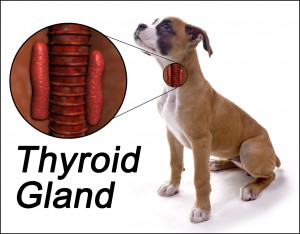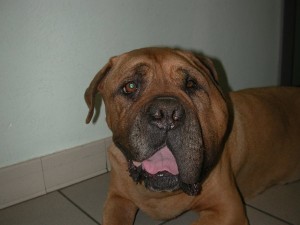The prefix “Hypo” is Latin and means low, under or not enough. Hypothyroidism then is a condition resulting when the thyroid gland is not producing enough hormone. It is a problem with the immune system where it attacks the thyroid gland, destroying the tissue and results in a deficiency of thyroid hormone.
Its not always easy to spot when a dog is hypothyroid as there is a miriad of signs and symptoms that they could exhibit or, conversely, they may show only one or two. More confusing still is the fact that some other conditions can cause low levels of thyroid hormone too and this can muddy the waters further.
Hypothyroidism is a very common hormonal problem, usually effecting dogs from around 4-7 years of age, but it can occur much earlier in some cases. Dogs who have been spayed or neutered are slightly more likely to suffer from hypothyroidism and some breeds in particular are more prone to it including the Rhodesian Ridgeback, Doberman, Golden Retriever, Airedale, Irish Setter, Dachshund, Poodle, Boxer and Miniature Schnauzer.
Symptoms: – please remember not all are likely to be present, perhaps just one or two
Lethargy and a general “can’t be bothered” mentality.
Dull/Depressed/Old before their time temperament.
Susceptibility to the cold – perhaps seeking out warm places in which to lie.
Weight gain, even when the food intake is reduced.
Poor coat condition including dullness, dandruff, poor hair growth rate.
Hairloss especially over the shoulders.
Hairloss on the tail which may become quite bald and rat-like.
Symmetrical patches of hair-loss particularly on the flanks and inner thighs.
The skin may thicken and becomes darkly pigmented, particularly on the inner ear.
The paws and ears may seem cool to the touch compared with non-effected dogs.
The heart rate is often slower than normal.
Skin folds on the face may increase giving a “tragic expression” associated with the disease.
Infertility can be a problem in entire dogs.
In severe cases, there may even be facial paralysis on one side.
Diagnosis:
Because there is such a varied list of possible signs, diagnosing hypothyroidism is not always straight forward and other things may be considered before this condition. Blood tests to assess thyroid function can be done to ascertain if anything else is going on under the surface.
Treatment:
If hypothyroidism is confirmed, then simply giving thyroid replacement therapy in tablet form is all that is required. Frequent blood tests are necessary to keep a close eye on the thyroid level once medication is started and the dog will have to remain on treatment for the rest of his life. The outlook for hypothyroid dogs on treatment is very good, although it may take a while at first for things to get back to normal with skin conditions and hair loss taking a little longer to improve. With thyroid replacement therapy, their quality of life and life expectancy should be unchanged.
P.S.
Since writing this blog, Im been made aware of another rare symptom of hypothyroidism – one I can only describe as “kicking its own butt”! Yes, I know this sounds funny and like Im joking but honestly, Im truly not. So, rather than try to explain it all, Ill merely copy you the message as it came across to me, written by the actual woman who’s dog experienced it. Id NEVER heard of it before but will certainly bare it in mind in the future.
Laurie writes “ok, this was a new one on me so I thought I would share.
I have a 10.5 year old Ridgeback Male (Mojave son named Boomer) that passed is OFFA testing years ago. He had no signs at of any thyroid issues… but he did start kicking his own butt.
Not kidding. About 4 weeks ago, Boomer started lifting his right back leg up when he walked, like a twitch. The foot when up so high it basically kicked his butt. No other issues. He has slowed down but he is a big dog and 10.5 years old. He deserves to slow down.
It started just once or twice a day I noticed it and by 2 weeks he was doing it a lot. I asked around, I looked on the Internet… finally found hypothyroidism neuropathy.
No other signs of Thyroid problems. No hair loss, no rash, no weight gain, no loss of muscle. Just butt kicking.
Took him to the vet. They ran complete blood work including chemistry profile, cbc, and T4. The T4 came back low normal ( 1 when 1-2.5 is normal). They sent more blood work out and sure enough, his TSH was very high.
Boomer has been on Thyroid meds now for over 10 days and he stopped butt kicking when he walks, now only does it when he moves too quickly.
We expect Boomer to make a complete recovery from his Butt Kicking issues… sorry too funny not to add that.
Anyways.. it was a new one on me. Over half of my older RR’s end up on Thyroid meds. It is just that way, they live longer then the Thyroid gland was meant to function. But none so have had any neuropathy issues.
Laurie Anderson
AndyboyRidgebacks.com“



